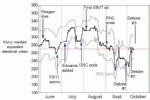Statistics
Statistics is a scientific discipline that helps people make decisions on the basis of evidence, often (but not always) numerical. Statistics are also numbers which summarise the results of a controlled study (a census or survey, an experiment), or other (often uncontrolled) collections of data. Whilst most people think of statistics in the latter form it is in the former that it can frequently be most powerful.
 How does it work?
How does it work?
Statistics can be applied in a number of scenarios:
Sampling – Sampling involves the selection of a part of some population or process so that inferences can be made about the whole.
Experimental design – Properly designed experiments with formally stated goals can save an organisation thousands of pounds relative to unstructured experimentation in which the outcome is frequently indeterminate.
Modelling - A description of the assumed structure of a set of observations that can range from a fairly imprecise verbal account to, more usually, a formalised mathematical expression of the process assumed to have generated the observed data.
Decision analysis - Decision analysis involves the structuring of a decision problem, e.g. by decision trees and influence diagrams, so that dependencies can be formally analysed.
Time series/longitudinal data - Frequently organisations collect data regularly over extended time periods. Such series may show trends, seasonality and more or less complex forms of internal dependence.
Calibration/assay - In many enterprises such as engineering and other laboratory-based industries, testing products or comparing samples / components is an essential part of the operation. Designing such tests is critical to ensure that appropriate precision and compatibility are achieved.
Quality control - Taguchi methods and Six-Sigma are concepts that are frequently bandied about, but what are the ideas behind them? One danger with the ‘branding’ of specific statistical ideas is that the method becomes paramount without an understanding of their origins or limitations.
Reliability - Reliability focuses on the ability of a product to perform its intended function without failure for a specified period of time under stated conditions.
Image Processing - Digital image processing and the analysis of information from images are methods that have become increasingly important in scientific research (particularly biological sciences) and many technical fields
Applications:
Statistics broad capabilities translate to a vast number of applications for example: Actuarial science; Biostatistics; Business Analytics; Chemometrics; Demography; Econometrics; Environmental statistics; Epidemiology; Geostatistics; Operations Research; Population Ecology; Quantitative Psychology; Psychometrics; Quality Control; Statistical Finance; Statistical Mechanics; Statistical Physics; Statistical Thermodynamics.
Sample handling requirements:
Valid, appropriate numerical data sets
Complementary techniques:
Complexity Science, Mathematical Modelling
Warwick Capability:
Risk Initiative and Statistical Consultancy Unit (RISCU)
Contact:
Claire Gerard: c dot gerard at warwick dot ac dot uk / 07385 145064
Typical results format, and sample:
Status |
Availability |
 |
Warwick collect/analyse data |
| Warwick collect data | |
 |
Available to user with expertise/ contribution |
 |
Spare capacity for collaborative research |
BOOK NOW |


